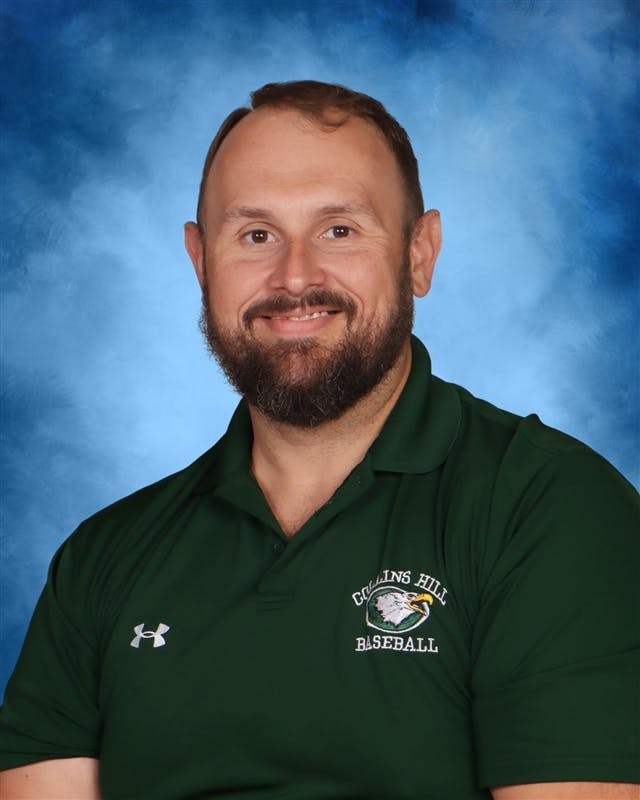Tommy Thrasher (M.A.T. ’25) and the world of special education are inextricably bound. In fact, his experience with individualized education programs and specialized instruction began long before joining the M.A.T. program at UGA.
- Hometown: Riverdale, GA; Lawrenceville, GA (currently)
- Degree objective and graduation date: M.A.T. in special education (general curriculum), 2025
- Degree(s) and graduation date: B.A. in English, 2006

Why did you choose to attend UGA for your advanced degree objective?
The University of Georgia has always been and will forever be my school. Several of my first memories as a child involved watching the Dawgs on television. The genuine passion I felt from an early age has persisted throughout my life. When I earned the opportunity to attend UGA as an undergraduate, my other options were rendered moot. To me, then and now, UGA is not just a school, but the school.
Entering the teaching profession and seeking an institution to attain a master’s degree in combination with a teacher certification, I was ecstatic to find that UGA offered the M.A.T. in special education program. As with my undergrad, the decision to attend UGA was straightforward. I knew I would receive an education of unparalleled quality and gain the ability to leverage knowledge and skills from a deep, comprehensive curriculum towards my goal—being the teacher and case manager my students deserve. Degrees from UGA wield considerable weight. They are indicative of diligence, persistence, and a commitment to excellence.
What sparked your interest in pursuing a degree and career in curriculum special education?
The world of special education and I are inextricably bound. My experience with individualized education programs (IEPs) and specialized instruction began long before joining the M.A.T. program at UGA. In 2012 nearing the end of first grade, my second oldest son was found eligible for special education services. The following year, my oldest son received an IEP too. Despite the eligibility determinations being two of the most painful moments of my life, I put my personal feelings aside. Inaction or avoidance due to momentary damage to my pride or letting fear and guilt win would have prevented my sons from receiving the support they needed. I could mitigate the internal emotional battle but found the notion of being a barrier to services intolerable.
Until they graduated high school in 2023 and 2024, respectively, I never missed an annual meeting or reevaluation. I remained in close contact with case managers and teachers, interacting with honesty and openness even when the subject matter was occasionally difficult to digest. By investing in the process, a source of pain evolved into a system of empowerment. My sons were active members of the student body, participated with their peers in the general curriculum and varsity sports, and graduated on time. I was witness to countless educators and school personnel over the years not only using their expertise, but their sincere, relentless love and care to usher my sons to better outcomes.
Provided the opportunity to become a case manager and language arts teacher in the resource- and co-taught settings, I accepted without hesitation. I saw the position as a means to marry my English degree and unique experience as a parent-turned-educator and case manager. Most importantly, accepting the role provided the capacity to pay forward all the patience, love, and kindness my sons received along the way.
What has been your favorite course in the College so far and why?
Entering a nationally ranked, top five master’s program, I harbored lofty expectations. I anticipated comprehensive instruction, professional growth, and rigorous challenges. What I found far exceeded those notions. The faculty not only brought exceptional, industry-leading knowledge, but also fostered an environment where high standards were met with support. Their ability to challenge while remaining deeply understanding is an experience for which I am sincerely grateful. For those reasons, I cannot choose just one class.
Being a language arts teacher, I routinely use the strategies learned in Dr. Kristin Sayeski’s “Teaching Writing to Students with Disabilities” class, as well as her “Designing Reading Interventions” course. Dr. Maria Shaheen’s knowledge about dyslexia and assessments has been pivotal in shaping my screening and progress monitoring procedures. Likewise, “Instruction of Students with High-Incidence Disabilities” with Dr. Bethany Hamilton-Jones and Dr. Rachel Cagliani’s “Positive Behavior Supports” resonated for their practical, accessible approach to classroom management.
I would be completely remiss without mentioning Dr. Kimberly Viel-Ruma and Dr. Amy Childre. Their greatness extends well beyond the courses they teach. Dr. Viel-Ruma is the standard for strong leadership, matching expertise with resolute kindness. Serving as my field supervisor, I had the privilege of collaborating with Dr. Childre in person. Her positivity, guidance, and grace have been invaluable.
How do you hope your advanced studies at UGA will enhance or contribute to your role as a practicing special education teacher?
With my master’s degree from UGA, I hope to deepen my impact as a special education professional through an increased focus on advocacy, both for students and their families. I aim to lead with a servant’s heart, grounded in empathy and an unwavering dedication to meeting students exactly where they are. My experience as a parent of sons with IEPs, combined with my education from UGA, inspires my resolve to prioritize active listening, build trust, and create partnerships with families navigating the special education process. Through a heightened holistic understanding of special education, I am committed to confronting disproportionality and bias and to using evidence-based practices to construct inclusive environments that meet the unique needs of every learner.